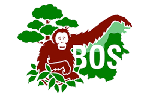by Caroliena Rahim
Orangutan, the red-hair great apes native to the island of Borneo and Sumatra are facing a high risk of extinction due to habitat loss and hunting. This highly intelligent creature shares 97% DNA as human. There are 3 species of Orangutan found in Indonesia, those are Bornean Orangutan, Sumatra Orangutan and the newly found Tapanuli Orangutan.
Adventure Indonesia had a privilege to join Orangutan Freedom trip by Borneo Orangutan Survival Foundation (BOSF) alongside the winners of Orangutan Freedom competition. Orangutan Freedom is a global campaign by BOS Foundation to raise awareness the conservation of Orangutan and their lush forest home.
Orangutan Freedom is an unforgettable Orangutan experience, an eye opening journey how serious the threats Orangutan is facing. For six days we were witnessed first-hand how the Orangutan conservation project running, accompanied by professional and highly dedicated staff. There are lot of things to take care of, from their nutrition, welfare, to their learning progress how they can live independently in the jungle.
The journey was started in Samboja Lestari, an Orangutan Rehabilitation centre in East Kalimantan, located about 38 km from Balikpapan. The area of 1.800 hectares is nestled in the rainforest of East Borneo. Samboja Lestari is made up of Orangutan pre-release islands and Sunbear Sanctuary and Samboja Lodge - an eco-friendly lodge where we spent 3 days as base for exploring Samboja Lestari.
We had a chance to visit the pre-release islands, the manmade islands with a 2.5 – 3 meters wide river as a border. The pre-release islands are where the Orangutansare re-introduced to their wild life. In additions to fruits and vegetables as their main food, Orangutans are given enrichment food. The enrichment food will be placed in certain locations; packed similarly to food they will likely find in the wild. We also visited Orangutan cages, both individual and social cages. The individual cages are occupied by the ones who suffered diseases.
We also got a special chance to visit the Sun bear sanctuary. This area of 58 hectares is the world’s largest sun bear sanctuary. Visiting Sun bear sanctuary was no less interesting than Orangutan islands. Sun bear, the smallest of its species live a semi wildlife environment.
There was a volunteering project in Samboja Lestari going on when we were there. Every volunteer has a chance to bring Orangutan food on feeding time.
Then in the late of afternoon of the third day we flew to Palangka Raya, the capital of Central Kalimantan.
From Palangka Raya we made daily journey to Nyaru Menteng Borneo Orangutan Survival Rescue centre. BOS Nyaru Menteng, the world’s largest Orangutan care centre, is currently housing more than 600 orphaned and displaced Orangutans.
Our first day in Nyaru Menteng - fourth day of the trip, was spent visiting Orangutan forest school where the orphaned Orangutans in the care of babysitters are taught how to survive in the wild, the survival skills they supposed to learn from their mother. The young Orangutan is known very dependent on their mother, spend the first 8 years of life with their mother – the longest of any mammals. Most of orphaned Orangutans were used to be kept illegally as a pet by villagers. They were cruelty taken from the mother, caged, chained which resulted severe trauma.
The highlight of the day was watching the playtime after forest school that took place at the Nyaru Menteng’s Orangutan playground. This playtime is a daily ritual in Nyaru Menteng. Every afternoon around 4pm, when they return from forest school, the Orangutan is given a chance to socialize with their peers. Sitting by the playground; watching a big number of cheeky young Orangutan playing was an extraordinary moment. The playground itself is situated in main center, a non public area.
Talking about non public area in the BOS Nyaru Menteng, as Orangutans are learning to become wild, a contact with human is forbidden except the caregivers and the official veterinarians. Therefore, the main center is not open for public. Those who are permitted to enter the main center are staff and official visitors.
However BOS Nyaru Menteng has an information center that open for public, a special place to educate the locals about the important of Orangutan conservation.
ORANGUTAN FREEDOM DAY
Today we escorted 4 adults Orangutan to Kaja Island, a pre-release island. These 4 individuals are among candidates to one day be released in their real wild forest home.
We had an early start from our base accommodation in Palangka Raya to Nyaru Menteng, then along with 4 Orangutan cages we drove to Sei Gohong pier where the cages were loaded onto wooden boats to be transferred to the releasing site. Then the cages were carried onto a feeding platform to be opened. It was an incredibly touching moment to see the Orangutans climbed the trees as soon as the cage’s doors opened.
Orangutans that inhabit the pre-release island are frequently monitored by BOS to observe their behavior whether they are ready to live independently in the wild or not.
Unfortunately not all Orangutans have the opportunity to go back to their native home. Despite the fact that Orangutan is among the smartest animals, some individuals are unable to learn the survival skill. These Orangutans were raised by human and remained depended on human to provide them food. It makes them loss their natural skill to survive in the wild. The natural skill here for instance are the skill of using tools (for food searching and nest building) climbing trees and avoiding predator. Some individuals are even suffered diseases. The ones who are suffered diseases are quarantined in individual cages to preventing the spread of disease and it would prevent them to return to their real home.

